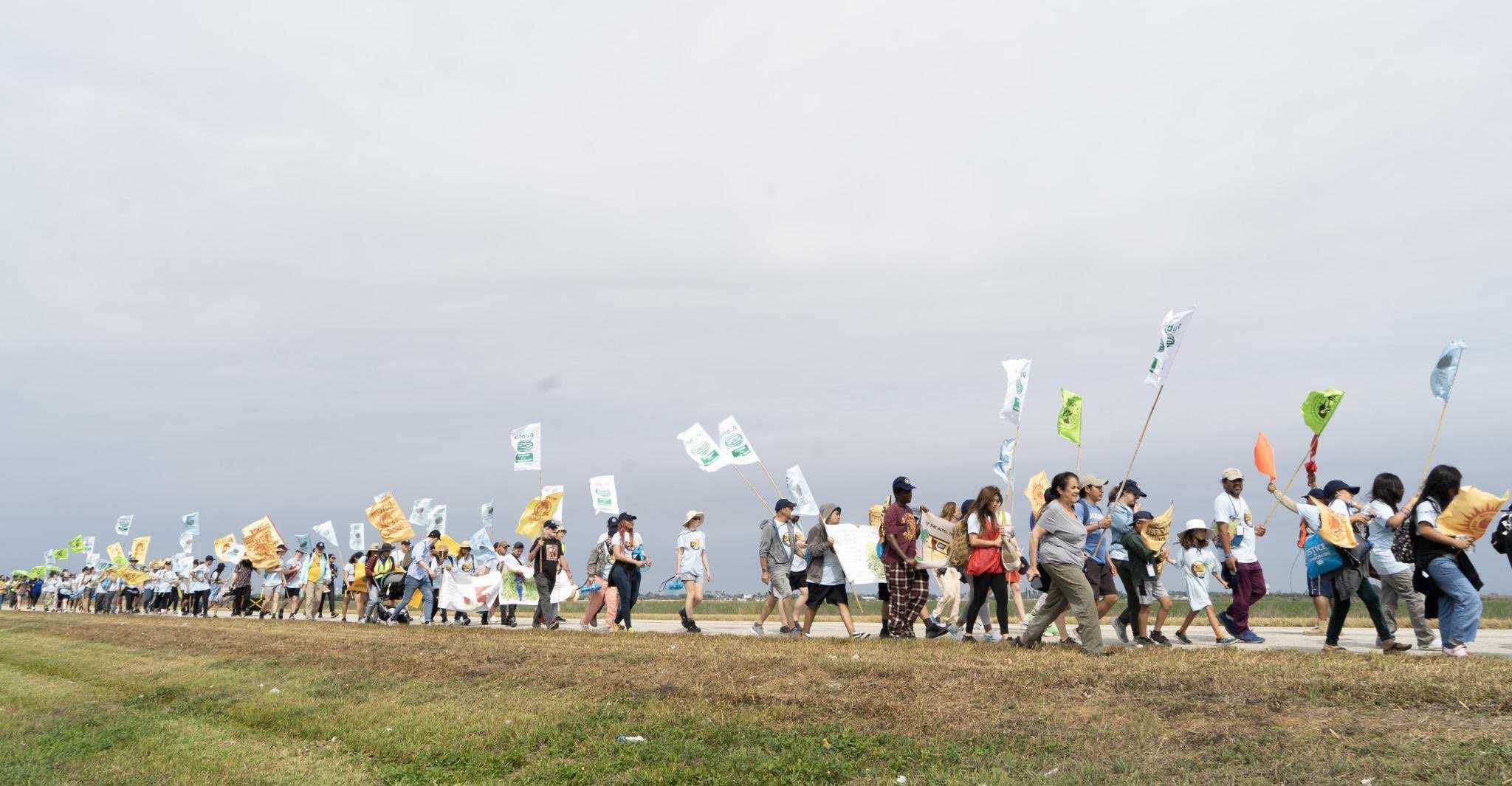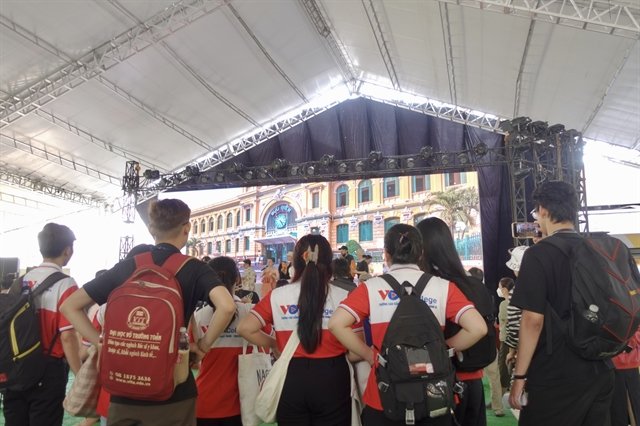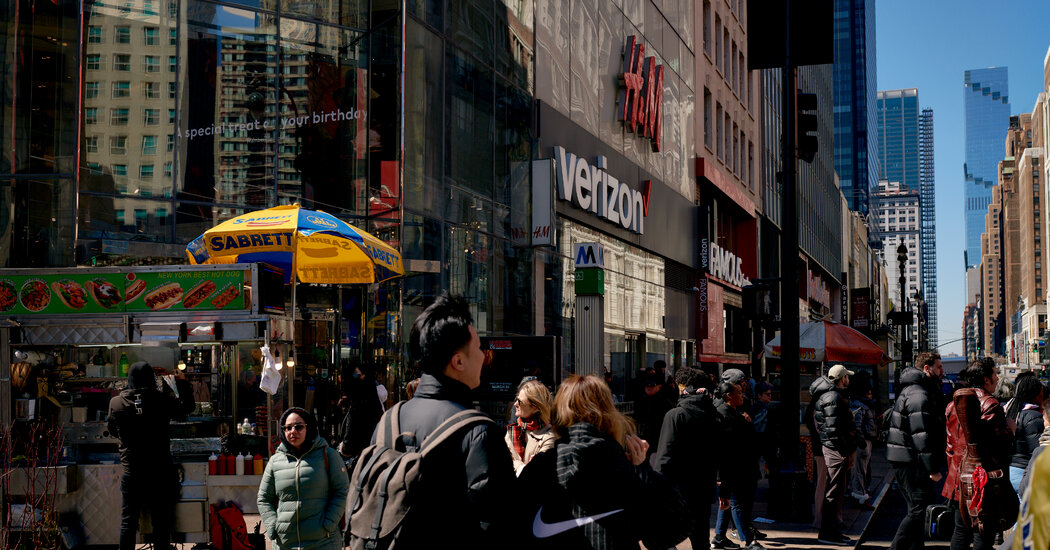[ad_1]
In December of 2016, the Coalition of Immokalee Workers (CIW), based out of Immokalee, Florida, received a phone call from two men who had just escaped captivity near the town of Pahokee by hiding in the trunk of a car. The two men were migrant farmworkers, working on H-2A visas, who had been harvesting watermelons for Bladimir Moreno, owner of the farm labor contracting business Los Villatoros Harvesting LLC—a business that, in reality, was little more than a modern-day slave camp. “They told of being held against their will on a labor camp surrounded by barbed wire,” the CIW notes, “working and living under constant surveillance, and earning extremely low pay.”
On Dec. 29, 2022, after a lengthy investigation and subsequent trial, a US District Court judge sentenced Moreno to 118 months in prison for leading a federal racketeering and forced labor conspiracy between 2015-2017, spanning multiple states. “According to court documents,” Kristin Leigh Lore reports,
Moreno owned, operated and managed LVH — a farm labor contracting company that brought large numbers of temporary, seasonal Mexican workers into the U.S. on H-2A agricultural visas — as a criminal enterprise. According to the Justice Department, Moreno compelled victims to work in Florida, Kentucky, Indiana, Georgia and North Carolina, and he also engaged in a pattern of racketeering activity that included visa fraud and fraud in foreign labor contracting… Once the immigrants arrived in the U.S., Moreno and his co-conspirators coerced over a dozen of them into providing long hours of physically demanding agricultural labor, six to seven days a week, for unreasonably little pay, according to the Justice Department, which said Moreno and his co-conspirators used various forms of coercion, including tactics such as:
- Imposing debts on the workers.
- Confiscating their passports.
- Subjecting them to crowded, unsanitary and degrading living conditions.
- Harboring them in the U.S. after their visas had expired.
- Threatening them with arrest and deportation if they failed to comply with demands.
For a variety of sordid and explicitly racist reasons, agricultural workers in the United States were deliberately exempted from the provisions circumscribed by the National Labor Relations Act of 1935. To this day, workers in this industry remain some of the most exploited and underrepresented across the workforce.
The horrors uncovered at Moreno’s operation—horrors that involved the enslavement, abuse, and exploitation of flesh-and-blood human beings right here, in the United States, all around us—are not some remnant of a grim, bygone past. They are a stark reminder of the dual realities that exist side by side across the landscape of American labor: One world where working people are at least recognized as human beings with the bare minimum of rights, and another world, a submerged world, where workers who are no less human are treated as cattle, or worse.
It is out of this underworld that the farmworkers of the CIW emerged in the early ’90s—and, along with their committed team of organizers and community supporters, they have remained a force to be reckoned with. For a variety of sordid and explicitly racist reasons, agricultural workers in the United States were deliberately exempted from the provisions circumscribed by the National Labor Relations Act of 1935. To this day, workers in this industry remain some of the most exploited and underrepresented across the workforce, with the majority of states still denying equal labor protections to farmworkers, including collective bargaining rights.
This is why—taken together with the harsh working conditions, the low pay, and workers’ vulnerability to extortion and harassment—the grassroots worker-to-worker organizing and national campaigns waged by the CIW are so vital, and so damn impressive. Perhaps the crowning achievement of the CIW so far is the Fair Food Program. Launched in 2011, the Fair Food Program promotes a model of worker-driven social responsibility that not only educates farmworkers about their rights but encourages—and, if necessary, applies pressure to—growers and retail buyers of their produce to commit to a system of humane business practices and mutual accountability. Participating buyers, for instance, agree to only source produce from growers who comply with the worker-developed code of conduct. As Derek Seidman writes,
“There are few human rights achievements that are so universally celebrated today as the farmworker-led Fair Food Program, a partnership between agricultural growers, sellers and workers with a proven record of ensuring an “ethical supply chain” from the farms where products are harvested, to the grocery stores where they’re sold, to the kitchen tables where they’re consumed.
The program has been lauded by the United Nations as an “international benchmark” in the fight against modern-day slavery and called one of “the most important social-impact success stories of the past century” by the Harvard Business Review. Major companies, from Walmart and Trader Joe’s to McDonald’s and Burger King — which otherwise have blemished records on everything from union-busting to sexual harassment to holding down the wage floor — have all laudably joined the Fair Food Program.
For the Coalition of Immokalee Workers, the main group behind the Fair Food Program, this makes it all the more disappointing that holdouts like fast food chain Wendy’s and the supermarket chains Kroger and Publix still refuse to join.
Kroger, it should be noted, was one of the retail giants identified by the Department of Labor that purchased produce harvested by workers slaving away for Bladimir Moreno’s LVH operation.
To compel these corporate chains to commit to only sourcing produce from growers that abide by the code of conduct laid out in the Fair Food Program, and to combat the scourge of forced labor that still plagues the agricultural supply chain, the CIW is leading the “Build a New World” march, which will last five days and cross a 50-mile expanse through Southern Florida. The march begins on Tuesday, March 14, in the agricultural community of Pahokee, where Moreno’s captive migrant workers were discovered, and will end at the wealthy enclave of Palm Beach on March 18. For TRNN, I spoke with Lupe Gonzalo, a longtime farmworker who is now a staff member and organizer for CIW, about the importance of this march, the success of the Fair Food Program, and the ongoing fight for dignity and justice for farmworkers everywhere.
Interpretation by: Ileana Roque González
Translation by: Adriana Garriga-López
Lupe Gonzalo: My name is Lupe Gonzalo. I’m currently a staff member at the Coalition of Immokalee Workers (CIW). I worked for about 12 years in the fields, mostly harvesting tomatoes, but I also used to do other types of work in the industry, as well.
When you arrive at these farms, the only tool they give you is a bucket—a bucket that you have to fill with tomatoes… We used to get paid 50 cents for each bucketful.
Lupe Gonzalo, Coalition of Immokalee Workers
As workers, we have faced situations of abuse for decades. One of the biggest problems that has affected women is sexual harassment on the part of their supervisors, contractors, or even their own co-workers. In the most extreme cases, workers have faced conditions akin to modern slavery—these are workers who have been deprived of their liberty, threatened, including receiving death threats. They have been violated.
This is why, around the 1990s, we started organizing workers here in Immokalee to demand justice and to see how we could eliminate these abuses. We conducted different actions, such as work stoppages, marches against violence, and a hunger strike that lasted 30 days. This was all taking place, more or less, in the 1990s, but we did not find a solution at that time. The violence against workers did decrease a bit, but other abuses continued.
So, then, in 2001, we began the Campaign for Fair Food, which we began to focus directly on the big corporations. Because corporations, when they buy their tomatoes, are looking for a good quality of product and fresh product, but they are not seeing the situations that workers are facing.
That’s why we began, as workers, to apply pressure more directly on the corporations, but also to educate consumers. The consumer should know where their products come from and what the labor conditions that workers endure to get those products on their tables are.
Maximillian Alvarez: Like you said, so many consumers don’t know (or don’t want to know) what workers like yourself go through to get their produce to the supermarket, to restaurants, etc. Can you say a little more about your own experience as a farmworker and what that work entails on a day-to-day basis? And who are the people primarily doing this kind of work?
Lupe Gonzalo: They are migrant workers who come here to Immokalee from different countries, specifically from Guatemala, Mexico, Haiti, and several other countries.
A normal day for us workers means waking up at 3:30AM to begin your day and prepare some food to take to the fields. For me, as a mother, it meant getting my children ready at that early morning hour to take them to someone else, another woman. There is no school or daycare that opens before 8AM. Therefore, there are other people who take care of children. So, I would take them there and then go to work.
When you arrive at these farms, the only tool they give you is a bucket—a bucket that you have to fill with tomatoes. A bucket weighs about 32 pounds or more when it’s filled up to the brim. When they tell you to pile the fruit above the rim, though, it can weigh up to 37 pounds. We used to get paid 50 cents for each bucketful. We did not get paid by the hour, we were never guaranteed a minimum salary at the end of the week—we got paid for each bucketful that we harvested. So, in order to be able to make a decent income at the end of the week, one had to harvest between 100-150 buckets per day. But that always depends on the weather, it depends on how hot it is and also on the experience of the workers.
Also, if you reported some abuse, or if you complained about the working conditions, the contractor would say, “Here’s the pay I’m offering, if you want it. Take it or leave it.”
And, as I mentioned before, sexual harassment is a problem that oftentimes affects women in the fields. When I was working there, there were contractors or co-workers who would touch you. Many times, when you would say, “I don’t want you to touch me,” they would just laugh at you or simply ignore you, and continue doing these things.
When it comes to the cases of enslavement, what we in the CIW have seen involves workers who have been imprisoned under lock and key—there are even workers who were put in chains so they could not escape.
Lupe Gonzalo, Coalition of Immokalee Workers
On top of that, there would often be times when it was very hot and you needed to drink some water; instead of letting you take a drink, though, they would yell at you, “Hold on, it’s about to rain,” or, “Go drink water from that ditch!”
Or, to give another example, when we wanted to use the bathrooms, the bathrooms were located very far away from where we would be working. The bathrooms were never cleaned, either. Weeks would pass and those bathrooms would get so dirty. Because of this, people would go into the woods [translator’s note: monte literally means “hill,” but it’s often used as an expression to refer to wildlands, or land that is not being cultivated, but is growing wild] to use the bathroom, because the bathroom was basically inaccessible. But going out to the woods, you also ran the risk of running into animals that could hurt you, too.
When it comes to the cases of enslavement, what we in the CIW have seen involves workers who have been imprisoned under lock and key—there are even workers who were put in chains so they could not escape. Workers there are surveilled. There is armed surveillance surrounding where they are living. When they go to work, they are pushed to work until very late, and the pay they receive is nothing, or almost nothing.
These are the kinds of abuses that we faced day-to-day. Whenever you wanted to speak out, as I mentioned, they would threaten to fire you, or some other kind of retaliation would sometimes be used against us. You had to decide: If I make a report, I run the risk of losing my job. How am I going to feed my family if I get fired? I better keep quiet, keep working, and make sure my family has food to eat.
Maximillian Alvarez: My God… This really highlights the dire need for worker organizations like the CIW, and the human stakes of the work you do.
Lupe Gonzalo: For us in the community, CIW is an organization that protects the human rights of workers. Regardless of where we come from, regardless of the legal status of the worker, it doesn’t matter: Human rights are human rights.
The CIW is a home base in Immokalee where workers can come and feel free to talk about any problems that are happening. The Coalition itself is made up of several staff members who used to work in the fields and who now work at the CIW full time, and part of the Coalition is made up of allies like Ileana who supported us and who are now part of the staff, as well.
Maximillian Alvarez: Let’s talk about the Fair Food Program, what it is, and how it has changed the industry for workers like yourself over the past 10 years…
Lupe Gonzalo: Yes, the Fair Food Program came from the victories that we won with the Campaign for Fair Food that we previously discussed. When we began to pressure the big corporations, we, the workers, would urge them to sign legally binding agreements committing them to participating in the Fair Food Program.
One of the legally binding agreements we pursued was with Taco Bell—that’s where it started. Our demand was that they should pay one more cent for every pound of tomatoes, and that this money should be directly distributed to the workers as a bonus payment.
The goal was also for Taco Bell to sign a code of conduct that was created by us, the workers, in which we were asking for basic rights like having water, shade, clean bathrooms, and breaks. But the code of conduct also included zero tolerance for harassment and sexual assault, and zero tolerance for modern slavery [translator’s note: forced labor, indentured servitude, or human trafficking].
We also pushed for workers to be able to have a voice at their workplace, so they could make reports without being fired or threatened.
So, with Taco Bell, we signed that agreement, but it took four years and one boycott to get there. After Taco Bell, well, there came other corporations. At this point, we have 14 corporations that have signed this agreement.
I spent more than a decade working in the fields without knowing my rights. But the moment my comrades arrived at the ranch where I worked and started talking to us, educating us, it was a pretty big deal for me. It’s pretty much the same thing for other workers on farms that participate in the Fair Food Program—it’s like night and day.
Lupe Gonzalo, Coalition of Immokalee Workers
In 2010, 90% of the ranches that produce tomatoes in the state of Florida also reached an agreement with us. Then, in 2011, we started implementing the Fair Food Program.
With the Fair Food Program, we basically hold these worker-to-worker educational sessions on the ranches. We speak with the workers in a place where they have some shade. They also now have clean water to drink, clean bathrooms—basically, everything that we were demanding, we now have it on the ranches. Another thing is now people are paid for their time [translator’s note: instead of per bucket], dignifying the life of the workers
Maximillian Alvarez: It sounds like the changes have been pretty dramatic for workers on farms that participate in the Fair Food Program?
Lupe Gonzalo: Yes, it’s been very interesting. When I received this training for the first time, for me, it had a pretty big impact. I spent more than a decade working in the fields without knowing my rights. But the moment my comrades arrived at the ranch where I worked and started talking to us, educating us, it was a pretty big deal for me. It’s pretty much the same thing for other workers on farms that participate in the Fair Food Program—it’s like night and day.
It is a new day for us, as workers, to have protections, to be able to make reports. There is now a complaint hotline open 24/7 that is accessible in whatever language one wants to make the complaint in. And there are bosses or supervisors who have been fired for not wanting to follow this new rule, this new acknowledgement that we farmworkers have human rights. This is a rule, not an option. They have to do it.
And, as women, the difference now is feeling that no one is touching you and no one is going to be harassing you. That is a pretty big relief. After work, we can get home and have a nice dinner with our kids without having to be worried about the dangers we might have to face tomorrow.
Maximillian Alvarez: Tell us about the march that’s happening this week. Why are workers marching? And what do you hope to achieve?
Lupe Gonzalo: The march is going to start on Tuesday of this week, from March 14-18. We’re going to start in Pahokee and we are going to finish in Palm Beach, where one of the top Wendy’s executives, Nelson Peltz, lives. We’re also going to stop by Publix and Wendy’s to protest, but we’re going to go as a big group marching for justice. (If people want to support us, they can follow us on our social media and continue learning from the workers of Immokalee.)
We continue this fight because, on the farms that don’t participate in the Fair Food Program, the problems continue and the abuses continue. Thus, the program has expanded to other states, to other products, and has expanded to other industries, even internationally. What we want is for more corporations to join us, more farms to cover the cost of the Fair Food Program.
In 2015-16, unfortunately, as I predicted would happen, we discovered a case of enslaved workers in Pahokee, Florida, which is where we are going to start the march this year. Workers there, who had arrived on H-2A visas, fell into the hands of a contractor who had them living in conditions of modern slavery. This is a problem that continues to plague the agricultural industry, and the corporations [that purchase from these farms] are not taking responsibility to ensure that the workers are protected.
When you know that abuses this extreme are happening, you cannot just stay at home and do nothing. You have to stand up. And that is what we are doing now: We are continuing to march for justice, because we want corporations like Wendy’s, like Publix, like Kroger, to join the Fair Food Program. We have asked these corporations to join us for years now, but they have refused to be part of the Program.
This is also about raising the consciousness of consumers. I think that, as consumers, we have a pretty important role to play in this fight for human rights. Consumers should know where the things we consume come from—we need to think about where our food comes from, and about the conditions that the workers who harvest our food confront every day. And consuming a product that was harvested with justice—that is surely something we all want.
When you know that abuses this extreme are happening, you cannot just stay at home and do nothing. You have to stand up. And that is what we are doing now: We are continuing to march for justice, because we want corporations like Wendy’s, like Publix, like Kroger, to join the Fair Food Program.
Lupe Gonzalo, Coalition of Immokalee Workers
As my colleague says, we are not mathematicians or anything like that, but we have an equation here at the Coalition of Immokalee Workers: C + C = C (Consciousness + Commitment = Change). We make the consumer aware, then they commit to supporting us by marching, coming to our protests, and making donations. There are a lot of people committed to supporting our struggle and we, the workers, can see the resulting changes..
Maximillian Alvarez: Speaking of supporting that struggle, there is a lot of popular enthusiasm for the labor movement right now, but people can often leave farmworkers out of the discussion (they really shouldn’t, but they do). Do you have any final words you wanted to share with folks reading this about the importance of showing solidarity with CIW and farmworkers everywhere?
Lupe Gonzalo: I have always said that for the workers in this country, nothing that we have has been given to us for free. There has always been a struggle. Yes, it is hard, but it is not impossible to get justice.
People can learn a lot from the workers of Immokalee. It is always possible to build community in our struggle, as we have done and will continue to do moving forward, always demanding what is just. We are not asking for anything that is not owed to us, only that which is fair.
Related
[ad_2]













